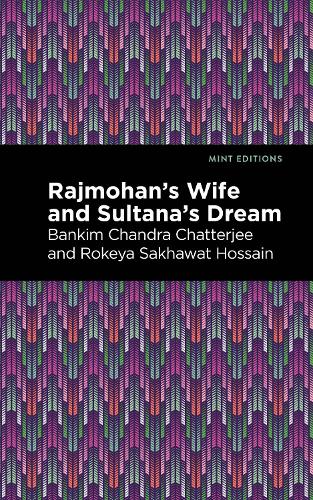
Rajmohan's Wife and Sultana's Dream
(Hardback)
Publishing Details
Rajmohan's Wife and Sultana's Dream
By (Author) Chandra Bankim Chatterjee
Contributions by Mint Editions
Contributions by Mint Editions
Mint Editions
Mint Editions
2nd November 2021
United States
Classifications
General
Non Fiction
Fiction in translation
Dystopian and utopian fiction
FIC
Physical Properties
Hardback
118
Width 127mm, Height 203mm
Description
Rajmohan's Wife and Sultana's Dream (1864/1908) features the debut novel of Indian writer Bankim Chandra Chatterjee and a story by Bengali writer, feminist, and educator Rokeya Sakhawat Hossain. Rajmohan's Wife, Chattopadhyay's only work in English, launched his career as a leading Bengali intellectual and political figure. Written in English, Sultana's Dream originated as a way of passing time for its young author while her husband was away on work. Initially published in The Indian Ladies Magazine, Sultana's Dream helped establish Rokeya's reputation as a leading figure in Bengali arts and culture.
Rajmohan's Wife is the story of Matangini, a beautiful woman married to a violent, jealous man. Unable to marry the man she loves-who happens to be her own sister's husband-she settles for the villainous Rajmohan, an abusive man who rules his middle-class Bengali household with an iron fist. With the help of her friend Kanak, Matangini does her best to avoid her husband's wrath, illuminating the importance of solidarity among women faced with oppression. Vindictive and cruel, Rajmohan secretly enacts a plan to rob Madhav, his brother-in-law, in order to obtain and invalidate a will.
Sultana's Dream is set in Ladyland is a feminist utopia ruled by women, a perfect civilization with no need for men, who remain secluded and without power. Free to develop their own society, women have invented flying cars, perfected farming to the point where no one must work, and harnessed the energy of the sun. With men under control, there is no longer fear, crime, or violence. Ultimately, Ladyland is a world made to mirror our own, a satirical exploration of the absolute power wielded by men over women, and a political critique of Bengali society at large. Sultana's Dream is more than a science fiction story; it is an act of resistance made by a woman who would shape the lives of her people through advocacy, education, and activism for generations to come.
This edition of Bankim Chandra Chatterjee and Rokeya Sakhawat Hossain's Rajmohan's Wife and Sultana's Dream is a classic of Bengali literature and utopian science fiction reimagined for modern readers.
Since our inception in 2020, Mint Editions has kept sustainability and innovation at the forefront of our mission. Each and every Mint Edition title gets a fresh, professionally typeset manuscript and a dazzling new cover, all while maintaining the integrity of the original book.
With thousands of titles in our collection, we aim to spotlight diverse public domain works to help them find modern audiences. Mint Editions celebrates a breadth of literary works, curated from both canonical and overlooked classics from writers around the globe.
Author Bio
Bankim Chandra Chatterjee (1838-1894) was an Indian novelist, poet, and journalist. Born into a Bengali Brahmin family, he was highly educated from a young age, graduating from Presidency College, Kolkata with an Arts degree in 1858. He later became one of the first graduates of the University of Calcutta before obtaining a Law degree in 1869. Throughout his academic career, he published numerous poems and stories in weekly newspapers and other publications. His first novel, Rajmohans Wife (1864), is his only work in English. Between 1863 and 1891, he worked for the government of Jessore, eventually reaching the positions of Deputy Magistrate and Deputy Collector. Anandamath (1828), a novel based on the Sannyasi Rebellion against British forces, served as powerful inspiration for the emerging Indian nationalist movement. Chatterjee is also known as the author of Vande Mataram, a Bengali and Sanskrit poem set to music by Bengali polymath and Nobel laureate Rabindranath Tagore. Rokeya Sakhawat Hossain (1880-1932) was a Bengali writer, feminist, educator, and activist. Born in Rangpur, modern-day Bangladesh, Rokeya was raised in a family of intellectuals and government figures. Interested in literature from a young age, she was encouraged by her older sister Karimunnesa, a poet and social worker, to expand her linguistic knowledge beyond Arabic and Persian by learning Bengali and English. In 1898, Rokeya married an older magistrate from Bhagalpur, a widower who encouraged her to continue her education as well as to pursue the craft of writing. In 1902, she published an essay in Bengali, beginning a career that would soon flourish with Matichur (1905) and Sultanas Dream (1908), the latter of which has since been recognized as a groundbreaking work of science fiction and feminist utopianism. Following her husbands death, she founded the Sakhawat Memorial Girls High School in his honor. Initially based in Bhagalpur, she moved the school to Calcutta in 1911 and acted as its head administrator until her death in 1932. Referred to honorifically as Begum Rokeya, she spent the remainder of her life as a tireless advocate for the rights of Bengalis and Muslim women.
